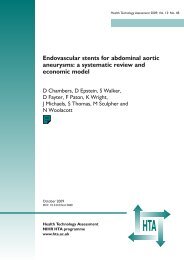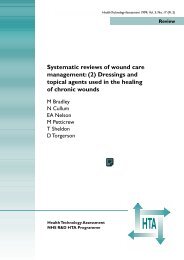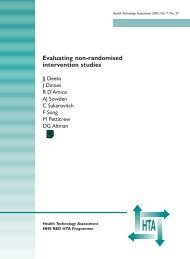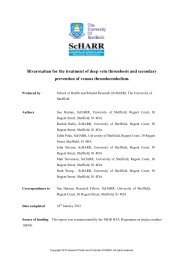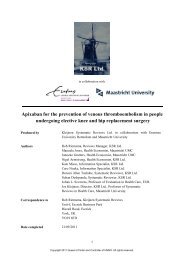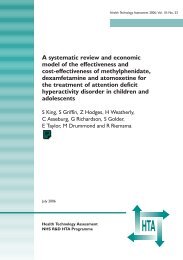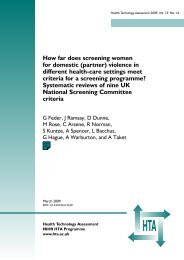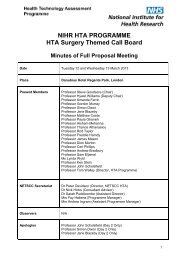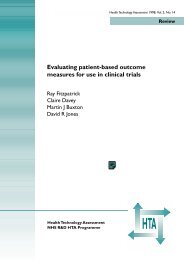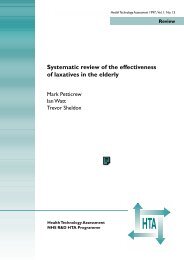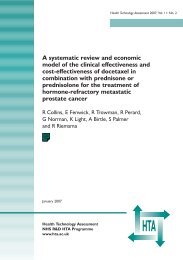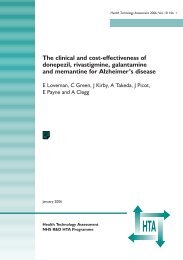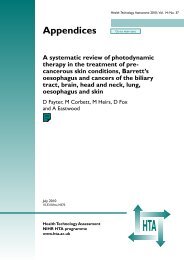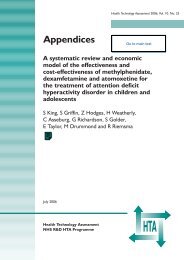Aanesthetic Agents for Day Surgery - NIHR Health Technology ...
Aanesthetic Agents for Day Surgery - NIHR Health Technology ...
Aanesthetic Agents for Day Surgery - NIHR Health Technology ...
You also want an ePaper? Increase the reach of your titles
YUMPU automatically turns print PDFs into web optimized ePapers that Google loves.
150<br />
Appendix 6<br />
TABLE 68 contd Summary of adult patient-based outcomes studies<br />
Study Investigations Outcome Results Conclusions and Reviewers’ comments<br />
and subjects measures grade of evidence<br />
Ghosh and Patient Self-administered Patient satisfaction: 52% Patients are satisfied Grade IV. Higher response<br />
Sallam, 1994, 178<br />
satisfaction questionnaire were impressed by first with their treatment; rate; difficult to assess<br />
UK following day (rating: area <strong>for</strong> class service at their contact with GP due questionnaire, as it is not<br />
surgery concern; outpatient visit; 6% were to problems with stated how the questions<br />
Descriptive (953/557 borderline; concerned; 62% felt that pain management. were asked<br />
survey (58.4%)) reserved the in<strong>for</strong>mation given was <strong>Day</strong> surgery provides<br />
satisfaction; first class compared with satisfaction <strong>for</strong> the<br />
first class) 8% who were concerned. majority of patients;<br />
2.5% contacted the does not produce<br />
hospital 24 h after their undue extra demands<br />
operation; 4.3% contacted on community services<br />
their GP<br />
Gnanalingham Hernia repair Interview either 91% of patients fit <strong>for</strong> A small minority of Grade IV<br />
and Budhoo, under local at hospital or local or general anaesthesia patients preferred day<br />
1998, 179 UK vs general by telephone preferred day surgery; 20% case hernia surgery; Patients interviewed<br />
anaesthesia had no preference <strong>for</strong> there was a greater preferred general<br />
Questionnaire type of anaesthesia; 33% preference <strong>for</strong> general anaesthesia (47%). 91% of<br />
survey Patients’ had a strong preference anaesthesia as the patients preferred day-case<br />
willingness to <strong>for</strong> local anaesthesia; 47% mode of anaesthesia. hernia repair. Patients were<br />
have day-case had a strong preference Authors felt that local young in comparison to<br />
hernia repairs <strong>for</strong> general anaesthesia. anaesthesia is desirable those opting <strong>for</strong> inpatient<br />
under local Preference <strong>for</strong> general and anxiety of patients surgery (p < 0.05)<br />
or general anaesthesia associated regarding local anaes-<br />
anaesthesia with previous adverse thesia should be<br />
experiences with local reduced <strong>for</strong> a<br />
anaesthesia and an greater acceptability<br />
‘assumed feeling of anxiety’<br />
if awake during surgery<br />
Gupta et al., Arthroscopy (1) Trieger <strong>Surgery</strong> was longer the in P-deletion test not Grade I<br />
1995, 78 Sweden Dot Test propofol group than the sensitive enough;Trieger<br />
(1) Propofol isoflurane group (p < 0.05); Dot Test was sensitive, Double-blind; the two<br />
RCT (24 patients) (2) P-deletion no significant difference but interpretation was outcome measures<br />
test (modified between groups in the subjective.There was (P-deletion test and Trieger<br />
(2) Isoflurane in version, Sweden, six variables studied or no difference in early Dot Test) were not suitable.<br />
O 2 (26 patients) found not to be in total mood score. recovery following Due to surgery being<br />
sensitive enough) Incidence of nausea and anaesthesia with longer in the propofol<br />
vomiting was 15% in propofol or isoflurane. group, the dose of alfentanil<br />
(3) Mood isoflurane group and Psychomotor recovery administered was greater.<br />
(MACL) 4% in propofol group was quicker following No difference in early<br />
isoflurane anaesthesia. recovery following<br />
(4) VAS pain Discharge times were anaesthesia with propofol<br />
scores similar in the two or isoflurane<br />
groups<br />
Gupta et al., (1) Propofol (1) Finger Mood: calmness p < 0.05 Desflurane is a useful Grade I<br />
1996, 79 Sweden induction; Tapping Test isoflurane vs desflurane; alternative to isoflurane,<br />
maintained with Finger Tapping Test, no but offers no clear Unblinded; small groups; no<br />
RCT desflurane in (2) Perception changes in baseline values advantage when used difference in psychomotor<br />
O 2 and N 2O (PAT) in desflurane group; in <strong>for</strong> maintenance of recovery using PAT and<br />
(25 patients) isoflurane group there anaesthesia <strong>for</strong> Finger Tapping Test.The VAS<br />
(3) Mood was significant impairment operations of <strong>for</strong> mood was not validated<br />
(2) Propofol (MACL) at 30 and 60 min short duration (translated from English<br />
induction; to Swedish)<br />
maintained with<br />
isoflurane in<br />
O 2 and N 2O<br />
(25 patients)<br />
continued



